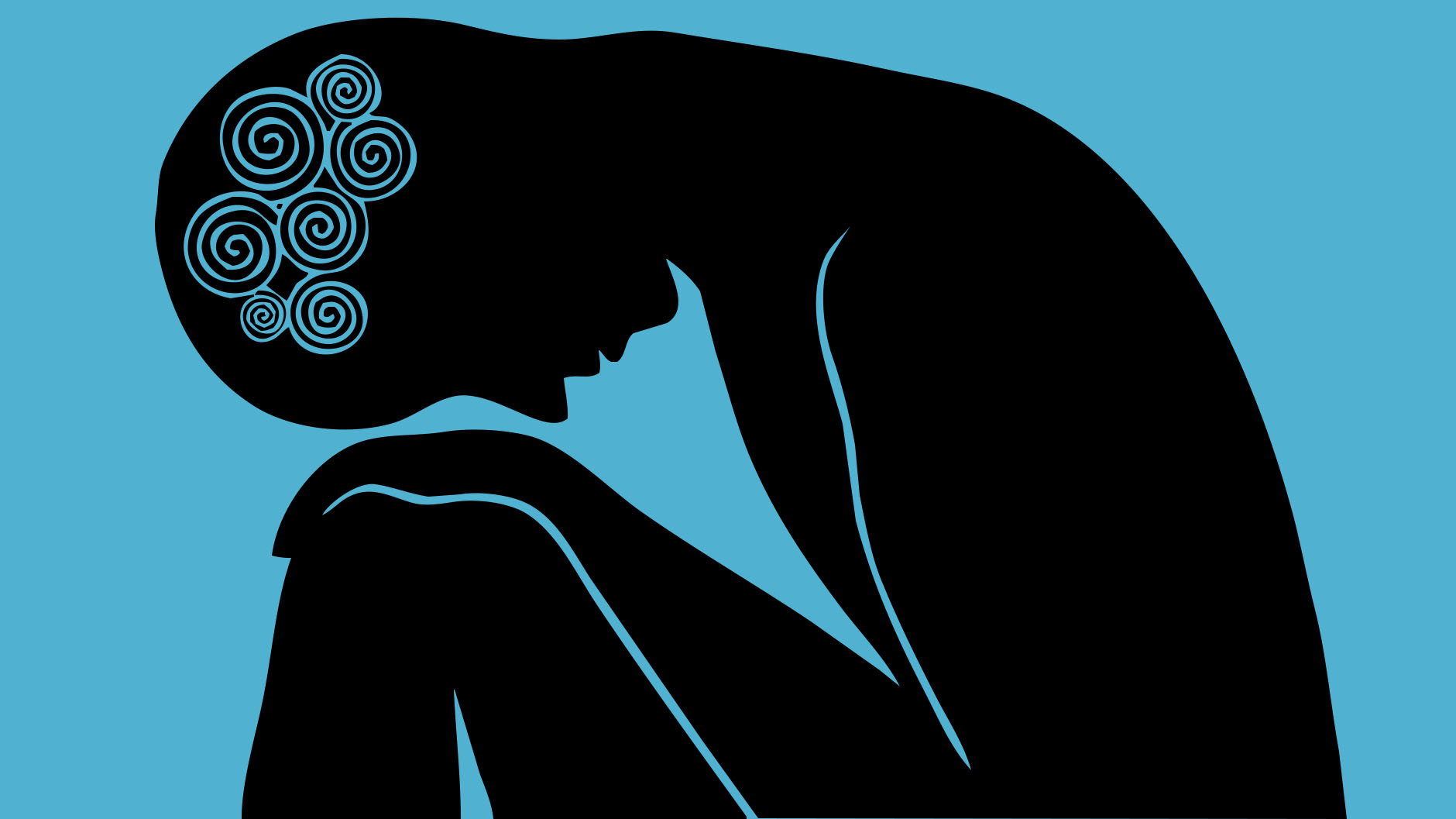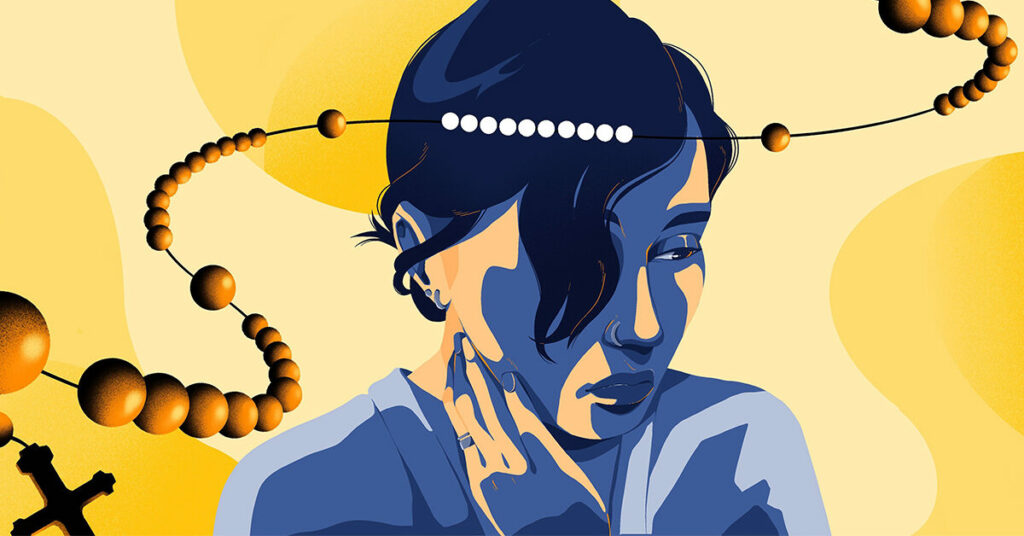When most people think of OCD, they typically think of a person who is excessively clean or someone who has to check things multiple times to make sure they are done correctly. While those are certainly common symptoms of OCD, there is another type of OCD that is not as well-known: religious OCD, or ROCD. This form of OCD can be just as debilitating as any other type, and it often causes a great deal of anxiety for the sufferer. In this article, we will discuss religious OCD in detail and provide some tips on how to cope with it.
Contents
What Is Religious OCD?
 Religious OCD is a subtype of OCD that is characterized by intrusive, unwanted thoughts and fears (obsessions) related to religious beliefs and practices. People with Religious OCD may have doubts about their faith or feeling that they are not good enough Christians, Muslims, Jews, etc. They may worry that they have committed blasphemy or that they will go to hell. These obsessions can lead to compulsions such as excessive prayer, reading religious texts, or seeking reassurance from clergy or others.
Religious OCD is a subtype of OCD that is characterized by intrusive, unwanted thoughts and fears (obsessions) related to religious beliefs and practices. People with Religious OCD may have doubts about their faith or feeling that they are not good enough Christians, Muslims, Jews, etc. They may worry that they have committed blasphemy or that they will go to hell. These obsessions can lead to compulsions such as excessive prayer, reading religious texts, or seeking reassurance from clergy or others.
Religious OCD can be a very isolating condition because it can cause people to doubt their most deeply-held beliefs. It can also be difficult to talk about because it is often seen as taboo. However, it is important to seek help if you are struggling with Religious OCD. Treatment can help you to manage your symptoms and live a fuller life.
Different Types Of Religious OCD
There are many different types of religious OCD. Here are some of the most common:
• Fear of Hell: This type of religious OCD is characterized by a fear of going to hell. The person may have intrusive thoughts about damnation and punishment. They may also worry that they will not be able to go to heaven if they do not follow certain religious rules or rituals.
• Fear of God: This type of religious OCD is characterized by a fear of God. The person may believe that they are not good enough for God. They may also have intrusive thoughts about being punished by God.
• Fear of Blasphemy: This type of religious OCD is characterized by a fear of blaspheming. The person may have intrusive thoughts about saying or doing something that would be considered blasphemy.
• Fear of Damning Others: This type of religious OCD is characterized by a fear of damning others. The person may have intrusive thoughts about condemning others to hell. They may also worry that they will not be able to go to heaven if they do not save others from hell.
Signs of Religious OCD

There are many signs of religious OCD, but some of the most common ones include:
Having intrusive thoughts or images about religious topics
This sign is often one of the most distressing for people with Religious OCD. The thoughts can be about anything related to religion, such as doubting your faith, committing blasphemy, or going to hell. There may be many different types of thoughts, and they can be very persistent.
Avoiding religious activities or places
People with Religious OCD may avoid anything that triggers their obsessions. This can mean avoiding religious activities, such as prayer or attending church. It may also mean avoiding places that remind them of religion, such as churches or temples. Having this sign can make it difficult to participate in religious life.
Excessive prayer or other religious rituals
People with Religious OCD may engage in compulsions, such as excessive prayer, reading religious texts, or seeking reassurance from clergy or others. These compulsions are meant to reduce the anxiety caused by the obsessions, but they often have the opposite effect. This is because they can reinforce the belief that the obsessions are true.
Spending a lot of time researching religious topics
Some people with Religious OCD become preoccupied with trying to find answers to their questions about religion. They may spend hours reading religious texts or talking to people about their beliefs. This can be a way of trying to control their thoughts and ease their anxiety.
Feeling guilty or ashamed
Many people with Religious OCD feel guilty or ashamed of their thoughts and behaviors. They may believe that they are bad people or that they are going to hell. This can lead to feelings of isolation and despair. Sometimes there may be suicidal ideation.
If you are experiencing any of these signs, it is important to seek help from a mental health professional who specializes in OCD. treatment can help you to manage your symptoms and live a fuller life. religious OCD does not have to control your life.
Causes of Religious OCD

There can be many causes of religious OCD, but some common ones include:
A need for control
People with OCD often feel the need to control their environment and themselves. This can manifest as a need to have everything “just so” or a fear of making mistakes. For people with religious OCD, this may manifest as a need to follow all the rules of their religion perfectly or fear of offending God. There may also be many other obsessive thoughts and compulsions related to other areas of life, such as work, relationships, or cleanliness.
A traumatic event
Sometimes a traumatic event can trigger OCD. This may be something like a car accident or the death of a loved one. For people with religious OCD, the trauma may be related to their religion. This could be something like hearing about a natural disaster that was interpreted as God’s punishment or being told by someone that they are going to hell.
A family history of OCD
OCD often runs in families, so if you have a relative with OCD, you may be more likely to develop the condition yourself. It is not known exactly why this is, but it is thought to be due to a combination of genetic and environmental factors. There may also be many other risk factors, such as anxiety or depression.
Perfectionism
People with OCD often strive for perfection in everything they do. This can be a good thing in some areas of life, but it can also lead to anxiety and compulsions when things aren’t perfect. For people with religious OCD, this may manifest as a need to pray perfectly or perform other religious rituals perfectly. There may be many other areas of life where this perfectionism manifests.
Depression
Depression is another common mental health condition that can lead to OCD. This is because depression can cause you to have negative thoughts about yourself, your life, and the world around you. These negative thoughts can become obsessions. There may be many other risk factors, such as anxiety or depression.
Abuse
Abuse is a common trigger for religious OCD. If you were abused by a religious figure, such as a priest, or if you witnessed abuse in a religious setting, you may be more likely to develop religious OCD. Abuse can cause you to question your faith and doubt your beliefs. It can also make you feel guilty and ashamed. These feelings can lead to an obsession with religion as a way to find answers and seek comfort.
Negative Impacts of Religious OCD

There may be many causes for why someone may develop religious OCD. For some, it may be due to a traumatic event that occurred in their childhood or adolescence. Others may have experienced a period of religious doubt and uncertainty which led to the development of OCD symptoms. Whatever the cause, religious OCD can have a significant negative impact on an individual’s life.
Some of these impacts are:
Impacts on Mental Health
Mental health is often negatively impacted by religious OCD. This is because obsessions and compulsions can be very distressing and time-consuming. They can also lead to feelings of guilt, shame, and isolation. In severe cases, religious OCD can lead to suicidal thoughts and behaviors.
Impacts on Physical Health
Physical health may also be impacted by religious OCD. This is because the condition can cause a lot of stress and anxiety. This can lead to problems such as insomnia, headaches, stomach problems, and weight loss or gain. These impacts on physical health can be very debilitating.
Impacts on Relationships
Relationships are often negatively impacted by religious OCD. This is because the condition can cause you to withdraw from social activities and isolate yourself from friends and family. You may also have difficulty trusting others and maintaining close relationships. In severe cases, religious OCD can lead to divorce or estrangement from loved ones.
Impacts on Work
There are also impacts on work. This is because religious OCD can cause you to miss work or be less productive when you are at work. You may also have difficulty concentrating and focusing on tasks. In severe cases, you may lose your job or have difficulty finding or keeping a job.
Impacts on Social Life
Sometimes, religious OCD can also impact your social life. This is because you may avoid social activities or places where there will be triggers for your OCD. For example, you may avoid going to church or other religious events. You may also avoid talking to people about your faith or avoiding discussions about religion altogether.
Gives Suicidal Thoughts
Sometimes there may be suicidal thoughts because of the number of negative impacts religious OCD has on an individual’s life. If you are experiencing suicidal thoughts, it is important to get help from a mental health professional or hotline immediately. It may also be helpful to talk to a friend or family member about what you are going through.
These are some of the impacts that religious OCD can have on an individual’s life. There are treatments available that can help lessen the symptoms of OCD and improve your quality of life.
Diagnosis of Religious OCD
Diagnosis of religious OCD can be difficult because many people who have religious OCD are reluctant to talk about their symptoms for fear of offending others or being seen as crazy. It is important to remember that OCD is a medical condition, not a sign of mental instability or lack of faith.
The diagnosis also can be difficult because the symptoms of religious OCD can mimic those of other disorders such as depression, anxiety, and psychosis.
To make a diagnosis, a mental health professional will usually start with a thorough medical and psychiatric evaluation. He or she will ask about your symptoms and how they impact your life.
The mental health professional will also likely want to talk to people who know you well to get their perspectives on your symptoms.
If the mental health professional suspects you have religious OCD, he or she may refer you to a specialist for further evaluation. The professional may also recommend cognitive behavioral therapy (CBT) or medication.
Treatment of Religious OCD

If you or someone you know is struggling with religious OCD, there are treatments available that can help lessen the symptoms of OCD and improve your quality of life. Some of these treatments include:
Medications
Medications can be one way to help reduce the symptoms of OCD. Commonly prescribed medications include selective serotonin reuptake inhibitors (SSRIs), which can help to improve mood and decrease anxiety. These medications are also used to treat other mental health conditions, such as depression and anxiety disorders.
Psychotherapy
Psychotherapy, or “talk therapy,” is another treatment option for religious OCD. This type of therapy can help you understand your thoughts and feelings about your religion and learn how to manage your OCD symptoms. Cognitive-behavioral therapy (CBT) is a type of psychotherapy that has been shown to be especially helpful in treating OCD. In CBT, you work with a therapist to identify and change the thoughts and behaviors that are contributing to your OCD symptoms.
There are many types of therapies that can help treat religious OCD. Some of these are:
Cognitive-Behavioral Therapy
Cognitive-behavioral therapy (CBT) is a type of therapy that helps people to change their thoughts and behaviors. In CBT, people with OCD learn how to identify and challenge their obsessive thoughts. They also learn how to expose themselves to the things they are afraid of in a safe way. CNT makes it very clear that the therapist and patient are a team working together to get rid of the OCD.
Exposure and Response Prevention Therapy
Exposure and response prevention therapy (ERP) is a type of CBT. In ERP, people with OCD are exposed to the things they are afraid of. They do this in a safe way, such as imaginal exposure or real-life exposure. Imaginal exposure involves thinking about or looking at pictures of the things you are afraid of. Real-life exposure involves going out into the world and facing your fears head-on. After each exposure, patients practice not doing their compulsions. Over time, they will find that their anxiety decreases and they can better control their compulsions.
ACT
ACT is a newer type of therapy that is based on the principle of acceptance. In the ACT, people learn to accept their thoughts and feelings without trying to change them. They also learn how to focus on things that are important to them, rather than on their OCD. This can be a very helpful approach for people who have found that other types of therapies have not worked for them.
DBT
Dialectical behavior therapy (DBT) is a type of therapy that helps people to deal with strong emotions. People with OCD often have trouble dealing with their emotions, so DBT can be a very helpful type of therapy. In DBT, people learn skills such as mindfulness, emotion regulation, and distress tolerance. These skills can help people with OCD to better control their emotions and compulsions.
Psychodynamic Therapy
Psychodynamic therapy is a type of therapy that focuses on the unconscious mind. In this type of therapy, people with OCD explore their early childhood experiences and how they might be affecting their current thoughts and behaviors. This can be a very helpful approach for people who have not had success with other types of therapies.
Support Groups
There are also support groups available for people with religious OCD. These groups can provide you with information, resources, and support from others who understand what you’re going through. Finding these support groups also make it possible to find people who can help you with your religious OCD.
Treatment for religious OCD is important because it can help lessen the symptoms of OCD and improve your quality of life. If you or someone you know is struggling with religious OCD, there are treatments available that can help.
How To Prevent Religious OCD?
Preventing religious OCD is not easy. It requires a lot of self-awareness and understanding. These are some of the tips to prevent religious OCD:
Avoid Triggers
Avoiding triggers are one of the most important things you can do to prevent religious OCD. Triggers are anything that makes your OCD worse. They can be people, places, things, or even thoughts. If you know what your triggers are, you can avoid them and keep your OCD under control.
Get Treatment Early
If you think you might have OCD, it is important to get treatment early. The sooner you start treatment, the better your chances of recovery. Sometimes there are many different types of therapies that can be helpful for OCD. If you get treatment early, you will have a better chance of finding the right type of therapy for you.
Talk To Someone Who Understands
If you have OCD, it is important to find someone who understands what you are going through. This could be a friend, family member, therapist, or support group. Talking to someone who understands can help you feel less alone and more supported in your recovery.
You can contact MantraCare for more tips on religious OCD. MantraCare provides online mental health services. You can get in touch with a mental health professional from the comfort of your own home. With MantraCare, you can get the help you need to recover from OCD.
Find Support Group
Support groups can be a great way to find support and understanding. There are many different types of support groups available, so there is sure to be one that is right for you. There are also many online support groups that you can join. These groups can be a great way to connect with other people who are going through similar experiences.
How To Help Someone With Religious OCD?

Heling someone with Religious OCD can be difficult. Here are some tips:
Be Supportive
Being supportive also means being accepting. It is important to accept that the person with OCD is going through a tough time. Avoid judgment and try to be understanding. There may be many different types of therapies that can be helpful for OCD. If you get treatment early, you will have a better chance of finding the right type of therapy for you.
Talk To Them About Their Treatment
If the person with OCD is in treatment, talk to them about their progress. This can be a great way to show your support and understanding. It can also help to keep the person with OCD motivated in their treatment. There may be many different types of therapies that can be helpful for OCD. If you get treatment early, you will have a better chance of finding the right type of therapy for them.
You can contact MantraCare for more tips on helping someone with religious OCD. MantraCare provides online mental health services. You can get in touch with a mental health professional from the comfort of your own home. With MantraCare, you can get the help you need to recover from OCD.
Educate Yourself
If you want to help someone with OCD, it is important to educate yourself about the disorder. Many books and websites can provide you with information about OCD. The more you know about OCD, the better equipped you will be to help someone with the disorder.
Give Them Space
You should also respect the person’s need for space. Some people with OCD may want to be alone when they are dealing with their symptoms. It is important to respect their wishes and give them the space they need.
Conclusion
Religious OCD is a very real and debilitating condition that can wreak havoc on a person’s life. If you or someone you know is struggling with religious OCD, please seek professional help. With treatment, people with religious OCD can learn to manage their obsessions and live fulfilling lives.
If you think you may have religious OCD, consider taking this self-test from us. Remember, only a professional can give you a diagnosis, but this test may be a helpful starting point. Contact us for treatment plans.
If you’re struggling with mental health problems, know that you’re not alone. MantraCare is here to help you with these mental health disorders. We offer group therapy, self-help strategies, and professional help. Contact us today to learn more about how we can help you! Helping someone with these disorders can be difficult, but it is important to encourage professional treatment, listen and be supportive, and encourage healthy coping mechanisms. MantraCare is here to help you every step of the way. You can also book a therapy or download our free Android or iOS app.


